HLT301 Assessment 1: Mental State Examination & Care Planning
VerifiedAdded on 2022/09/15
|8
|1914
|23
Homework Assignment
AI Summary
This assignment is a comprehensive analysis of a mental state examination, specifically focusing on a case study involving a patient exhibiting symptoms of mania. The student defines mental state assessment, its utility in nursing and midwifery, and describes the patient's appearance, behavior, and speech patterns during the initial assessment. The document differentiates between mood and affect, discusses the patient's speech characteristics, and identifies signs and symptoms consistent with mania, including overconfidence, decreased need for sleep, unusual talkativeness, racing thoughts, and a short attention span. The assignment also explores the tests Dr. Beddi might request, the documentation in progress notes regarding the patient's thoughts and perceptions, and the patient's insight into his condition, along with associated outcomes and judgment. Furthermore, the assignment addresses the risks the patient presents, considering functional impairment, potential for family issues, and the development of diseases. Finally, the student outlines appropriate interventions, treatment, and care pathways, including medication options (monotherapy and combination therapy), and the importance of thorough assessments before starting treatment, referencing relevant academic sources to support the plans.
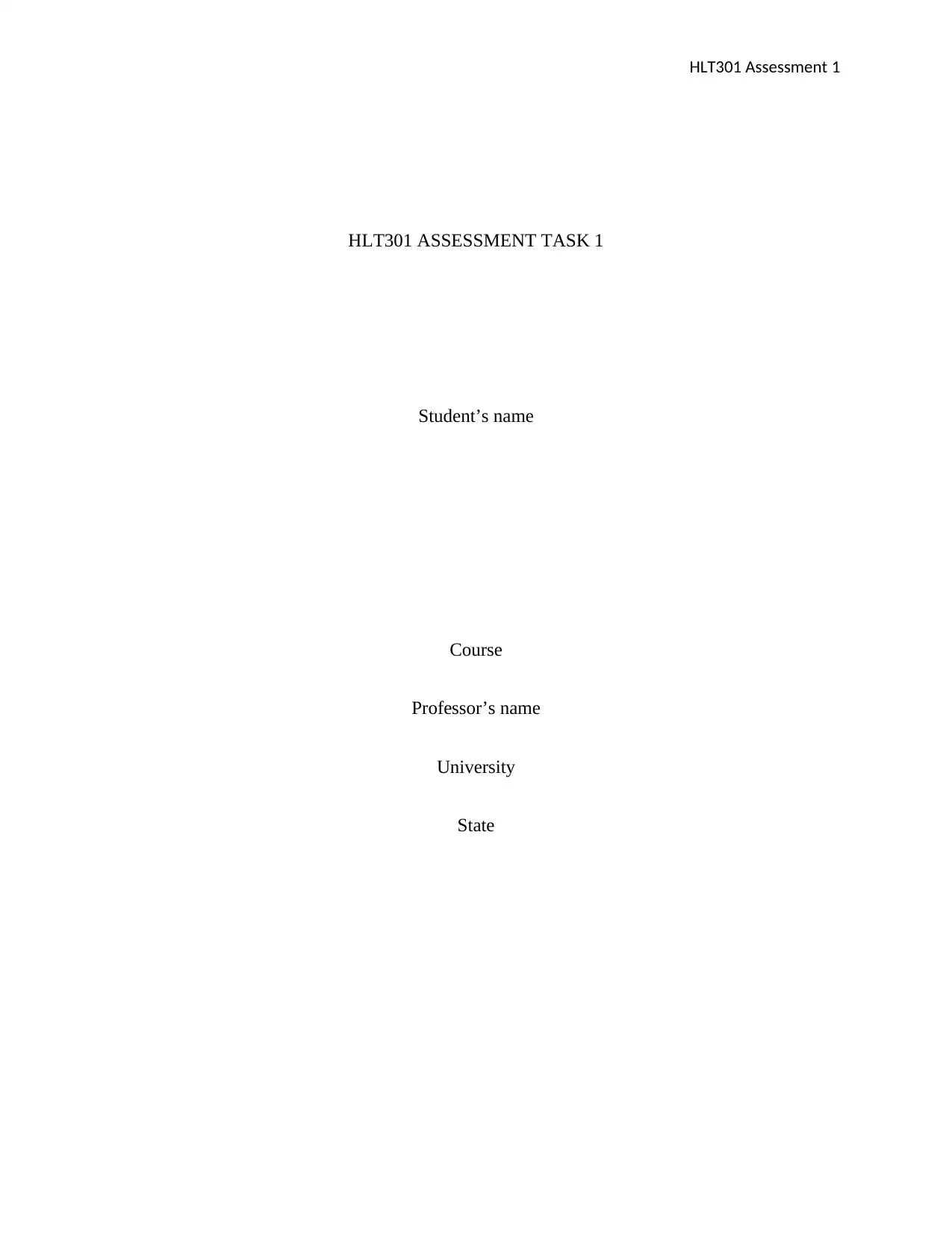
HLT301 Assessment 1
HLT301 ASSESSMENT TASK 1
Student’s name
Course
Professor’s name
University
State
HLT301 ASSESSMENT TASK 1
Student’s name
Course
Professor’s name
University
State
Paraphrase This Document
Need a fresh take? Get an instant paraphrase of this document with our AI Paraphraser
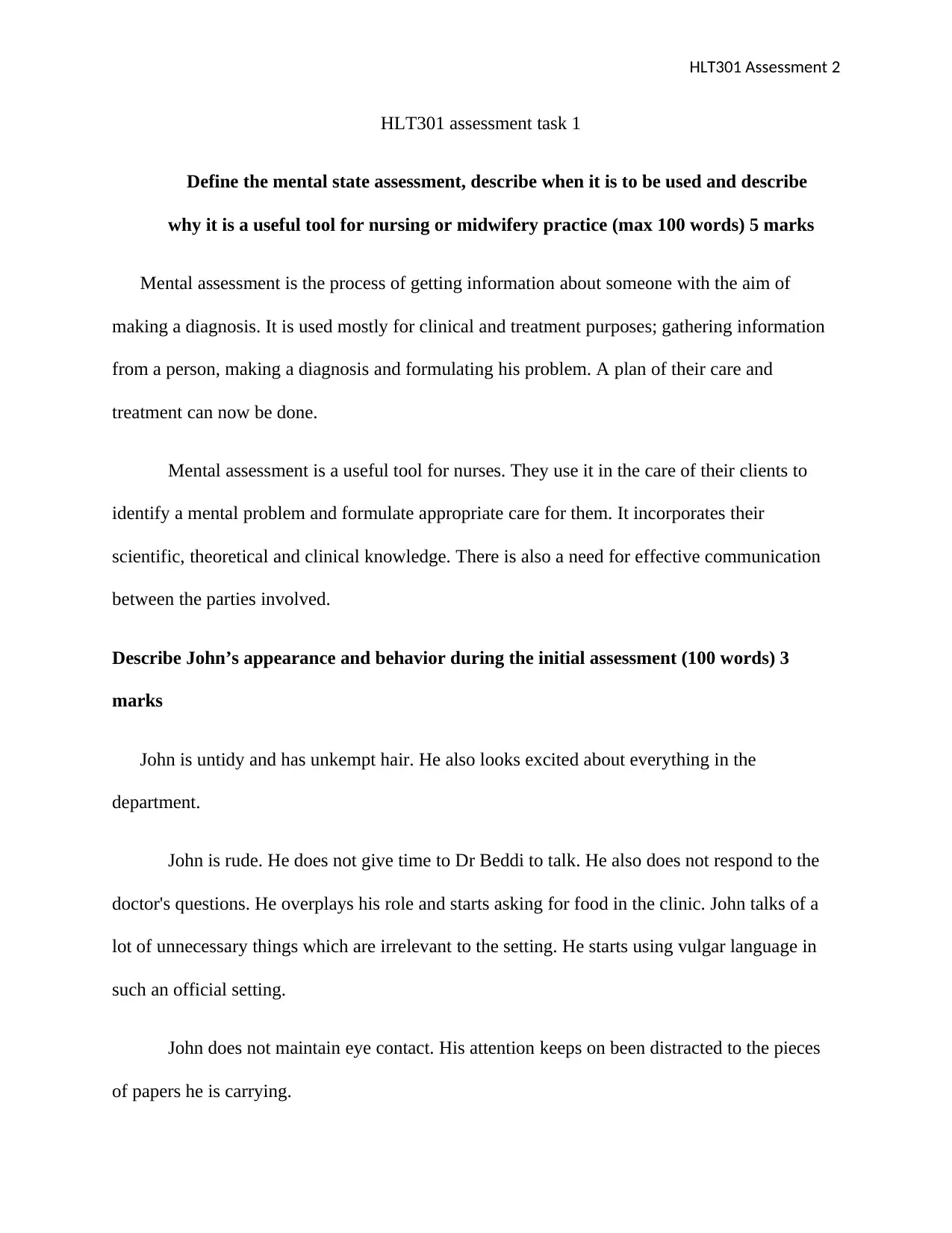
HLT301 Assessment 2
HLT301 assessment task 1
Define the mental state assessment, describe when it is to be used and describe
why it is a useful tool for nursing or midwifery practice (max 100 words) 5 marks
Mental assessment is the process of getting information about someone with the aim of
making a diagnosis. It is used mostly for clinical and treatment purposes; gathering information
from a person, making a diagnosis and formulating his problem. A plan of their care and
treatment can now be done.
Mental assessment is a useful tool for nurses. They use it in the care of their clients to
identify a mental problem and formulate appropriate care for them. It incorporates their
scientific, theoretical and clinical knowledge. There is also a need for effective communication
between the parties involved.
Describe John’s appearance and behavior during the initial assessment (100 words) 3
marks
John is untidy and has unkempt hair. He also looks excited about everything in the
department.
John is rude. He does not give time to Dr Beddi to talk. He also does not respond to the
doctor's questions. He overplays his role and starts asking for food in the clinic. John talks of a
lot of unnecessary things which are irrelevant to the setting. He starts using vulgar language in
such an official setting.
John does not maintain eye contact. His attention keeps on been distracted to the pieces
of papers he is carrying.
HLT301 assessment task 1
Define the mental state assessment, describe when it is to be used and describe
why it is a useful tool for nursing or midwifery practice (max 100 words) 5 marks
Mental assessment is the process of getting information about someone with the aim of
making a diagnosis. It is used mostly for clinical and treatment purposes; gathering information
from a person, making a diagnosis and formulating his problem. A plan of their care and
treatment can now be done.
Mental assessment is a useful tool for nurses. They use it in the care of their clients to
identify a mental problem and formulate appropriate care for them. It incorporates their
scientific, theoretical and clinical knowledge. There is also a need for effective communication
between the parties involved.
Describe John’s appearance and behavior during the initial assessment (100 words) 3
marks
John is untidy and has unkempt hair. He also looks excited about everything in the
department.
John is rude. He does not give time to Dr Beddi to talk. He also does not respond to the
doctor's questions. He overplays his role and starts asking for food in the clinic. John talks of a
lot of unnecessary things which are irrelevant to the setting. He starts using vulgar language in
such an official setting.
John does not maintain eye contact. His attention keeps on been distracted to the pieces
of papers he is carrying.
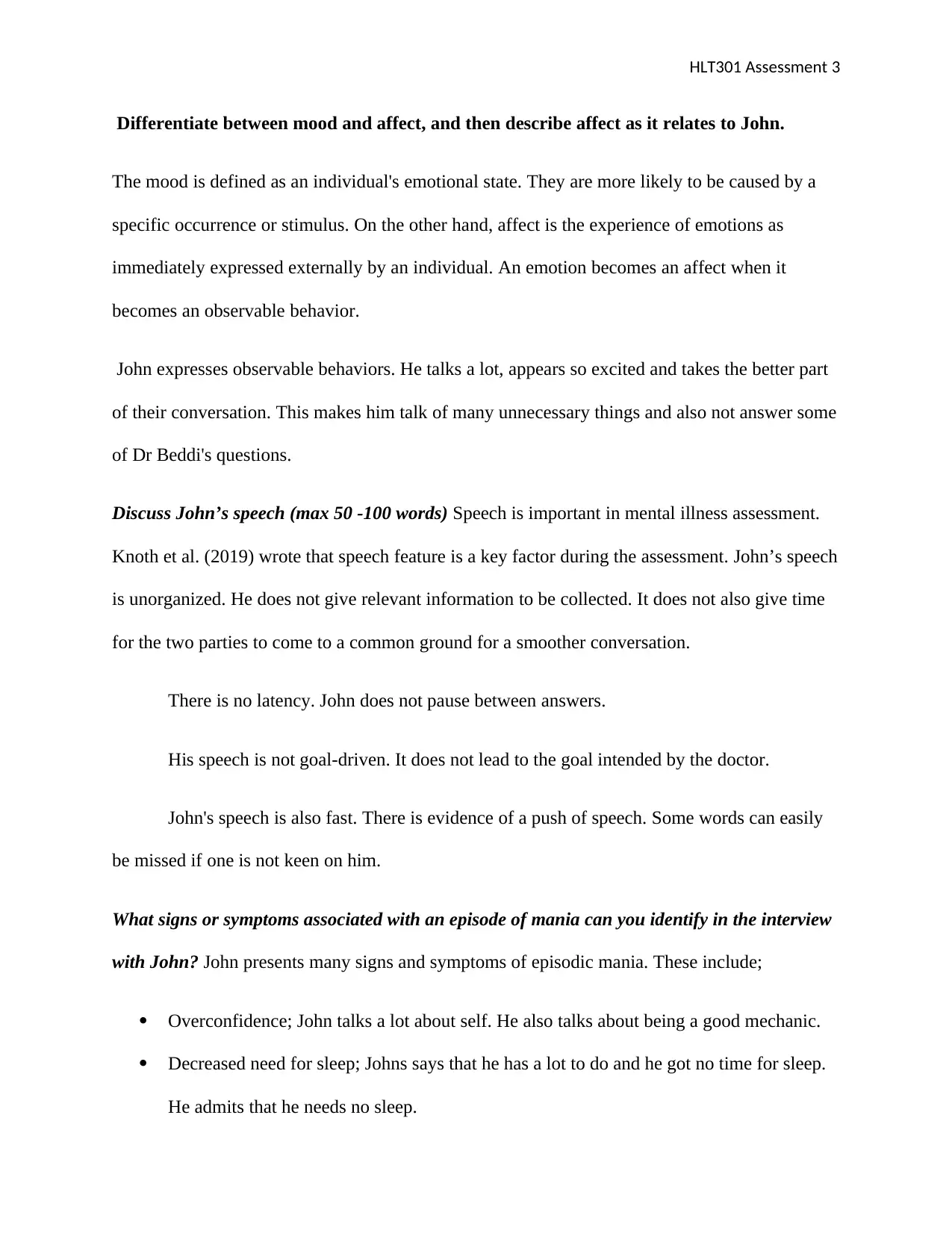
HLT301 Assessment 3
Differentiate between mood and affect, and then describe affect as it relates to John.
The mood is defined as an individual's emotional state. They are more likely to be caused by a
specific occurrence or stimulus. On the other hand, affect is the experience of emotions as
immediately expressed externally by an individual. An emotion becomes an affect when it
becomes an observable behavior.
John expresses observable behaviors. He talks a lot, appears so excited and takes the better part
of their conversation. This makes him talk of many unnecessary things and also not answer some
of Dr Beddi's questions.
Discuss John’s speech (max 50 -100 words) Speech is important in mental illness assessment.
Knoth et al. (2019) wrote that speech feature is a key factor during the assessment. John’s speech
is unorganized. He does not give relevant information to be collected. It does not also give time
for the two parties to come to a common ground for a smoother conversation.
There is no latency. John does not pause between answers.
His speech is not goal-driven. It does not lead to the goal intended by the doctor.
John's speech is also fast. There is evidence of a push of speech. Some words can easily
be missed if one is not keen on him.
What signs or symptoms associated with an episode of mania can you identify in the interview
with John? John presents many signs and symptoms of episodic mania. These include;
Overconfidence; John talks a lot about self. He also talks about being a good mechanic.
Decreased need for sleep; Johns says that he has a lot to do and he got no time for sleep.
He admits that he needs no sleep.
Differentiate between mood and affect, and then describe affect as it relates to John.
The mood is defined as an individual's emotional state. They are more likely to be caused by a
specific occurrence or stimulus. On the other hand, affect is the experience of emotions as
immediately expressed externally by an individual. An emotion becomes an affect when it
becomes an observable behavior.
John expresses observable behaviors. He talks a lot, appears so excited and takes the better part
of their conversation. This makes him talk of many unnecessary things and also not answer some
of Dr Beddi's questions.
Discuss John’s speech (max 50 -100 words) Speech is important in mental illness assessment.
Knoth et al. (2019) wrote that speech feature is a key factor during the assessment. John’s speech
is unorganized. He does not give relevant information to be collected. It does not also give time
for the two parties to come to a common ground for a smoother conversation.
There is no latency. John does not pause between answers.
His speech is not goal-driven. It does not lead to the goal intended by the doctor.
John's speech is also fast. There is evidence of a push of speech. Some words can easily
be missed if one is not keen on him.
What signs or symptoms associated with an episode of mania can you identify in the interview
with John? John presents many signs and symptoms of episodic mania. These include;
Overconfidence; John talks a lot about self. He also talks about being a good mechanic.
Decreased need for sleep; Johns says that he has a lot to do and he got no time for sleep.
He admits that he needs no sleep.
⊘ This is a preview!⊘
Do you want full access?
Subscribe today to unlock all pages.

Trusted by 1+ million students worldwide
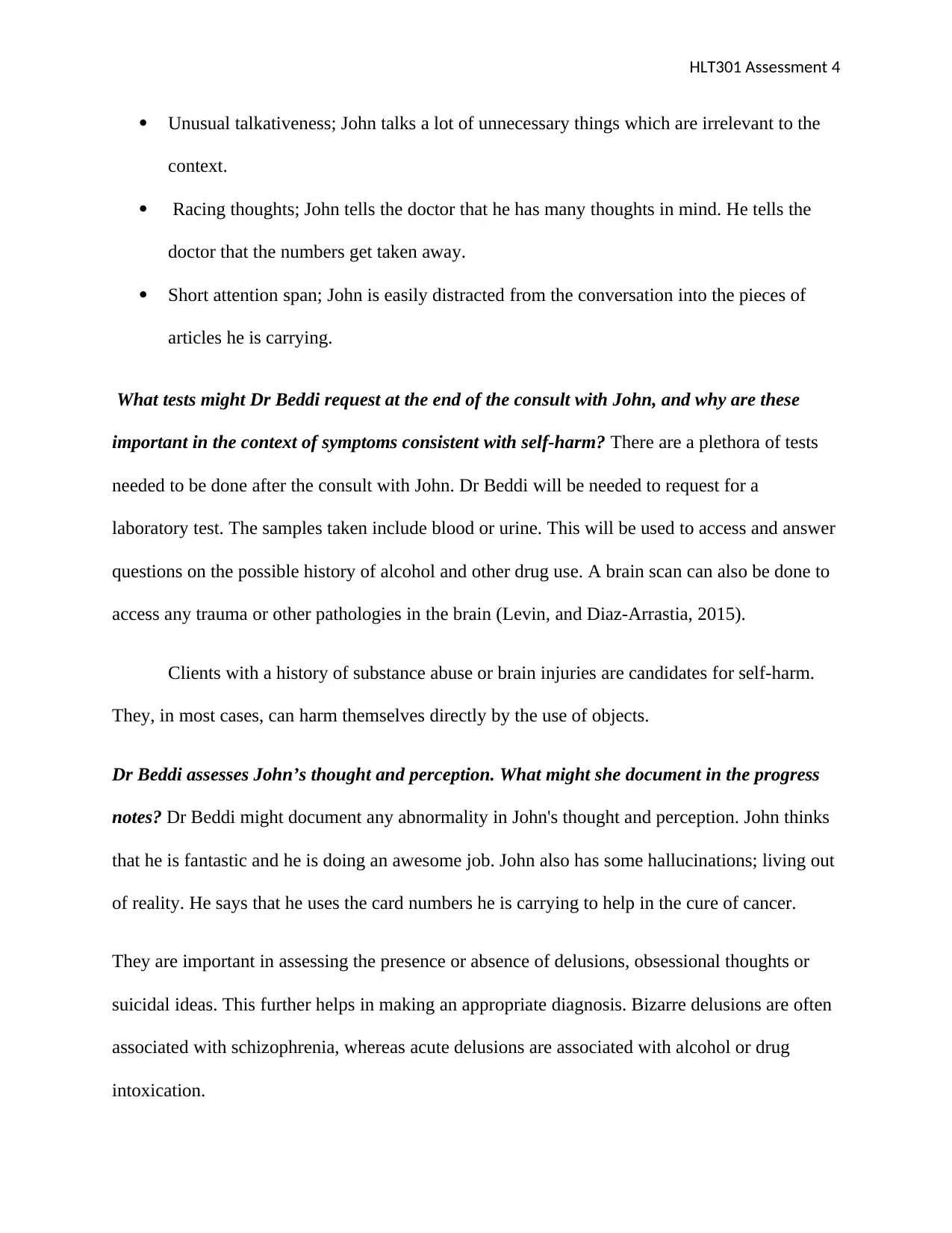
HLT301 Assessment 4
Unusual talkativeness; John talks a lot of unnecessary things which are irrelevant to the
context.
Racing thoughts; John tells the doctor that he has many thoughts in mind. He tells the
doctor that the numbers get taken away.
Short attention span; John is easily distracted from the conversation into the pieces of
articles he is carrying.
What tests might Dr Beddi request at the end of the consult with John, and why are these
important in the context of symptoms consistent with self-harm? There are a plethora of tests
needed to be done after the consult with John. Dr Beddi will be needed to request for a
laboratory test. The samples taken include blood or urine. This will be used to access and answer
questions on the possible history of alcohol and other drug use. A brain scan can also be done to
access any trauma or other pathologies in the brain (Levin, and Diaz-Arrastia, 2015).
Clients with a history of substance abuse or brain injuries are candidates for self-harm.
They, in most cases, can harm themselves directly by the use of objects.
Dr Beddi assesses John’s thought and perception. What might she document in the progress
notes? Dr Beddi might document any abnormality in John's thought and perception. John thinks
that he is fantastic and he is doing an awesome job. John also has some hallucinations; living out
of reality. He says that he uses the card numbers he is carrying to help in the cure of cancer.
They are important in assessing the presence or absence of delusions, obsessional thoughts or
suicidal ideas. This further helps in making an appropriate diagnosis. Bizarre delusions are often
associated with schizophrenia, whereas acute delusions are associated with alcohol or drug
intoxication.
Unusual talkativeness; John talks a lot of unnecessary things which are irrelevant to the
context.
Racing thoughts; John tells the doctor that he has many thoughts in mind. He tells the
doctor that the numbers get taken away.
Short attention span; John is easily distracted from the conversation into the pieces of
articles he is carrying.
What tests might Dr Beddi request at the end of the consult with John, and why are these
important in the context of symptoms consistent with self-harm? There are a plethora of tests
needed to be done after the consult with John. Dr Beddi will be needed to request for a
laboratory test. The samples taken include blood or urine. This will be used to access and answer
questions on the possible history of alcohol and other drug use. A brain scan can also be done to
access any trauma or other pathologies in the brain (Levin, and Diaz-Arrastia, 2015).
Clients with a history of substance abuse or brain injuries are candidates for self-harm.
They, in most cases, can harm themselves directly by the use of objects.
Dr Beddi assesses John’s thought and perception. What might she document in the progress
notes? Dr Beddi might document any abnormality in John's thought and perception. John thinks
that he is fantastic and he is doing an awesome job. John also has some hallucinations; living out
of reality. He says that he uses the card numbers he is carrying to help in the cure of cancer.
They are important in assessing the presence or absence of delusions, obsessional thoughts or
suicidal ideas. This further helps in making an appropriate diagnosis. Bizarre delusions are often
associated with schizophrenia, whereas acute delusions are associated with alcohol or drug
intoxication.
Paraphrase This Document
Need a fresh take? Get an instant paraphrase of this document with our AI Paraphraser
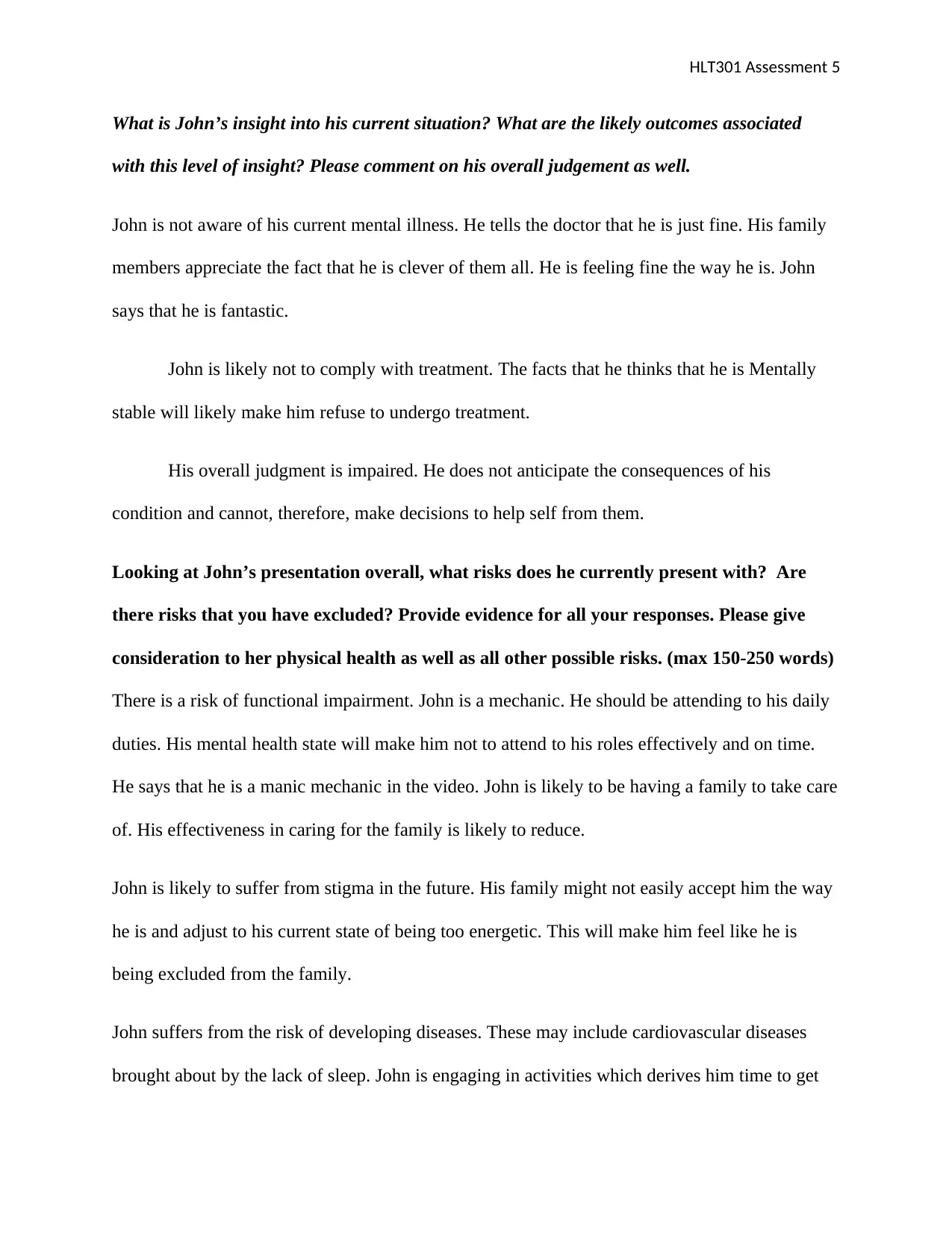
HLT301 Assessment 5
What is John’s insight into his current situation? What are the likely outcomes associated
with this level of insight? Please comment on his overall judgement as well.
John is not aware of his current mental illness. He tells the doctor that he is just fine. His family
members appreciate the fact that he is clever of them all. He is feeling fine the way he is. John
says that he is fantastic.
John is likely not to comply with treatment. The facts that he thinks that he is Mentally
stable will likely make him refuse to undergo treatment.
His overall judgment is impaired. He does not anticipate the consequences of his
condition and cannot, therefore, make decisions to help self from them.
Looking at John’s presentation overall, what risks does he currently present with? Are
there risks that you have excluded? Provide evidence for all your responses. Please give
consideration to her physical health as well as all other possible risks. (max 150-250 words)
There is a risk of functional impairment. John is a mechanic. He should be attending to his daily
duties. His mental health state will make him not to attend to his roles effectively and on time.
He says that he is a manic mechanic in the video. John is likely to be having a family to take care
of. His effectiveness in caring for the family is likely to reduce.
John is likely to suffer from stigma in the future. His family might not easily accept him the way
he is and adjust to his current state of being too energetic. This will make him feel like he is
being excluded from the family.
John suffers from the risk of developing diseases. These may include cardiovascular diseases
brought about by the lack of sleep. John is engaging in activities which derives him time to get
What is John’s insight into his current situation? What are the likely outcomes associated
with this level of insight? Please comment on his overall judgement as well.
John is not aware of his current mental illness. He tells the doctor that he is just fine. His family
members appreciate the fact that he is clever of them all. He is feeling fine the way he is. John
says that he is fantastic.
John is likely not to comply with treatment. The facts that he thinks that he is Mentally
stable will likely make him refuse to undergo treatment.
His overall judgment is impaired. He does not anticipate the consequences of his
condition and cannot, therefore, make decisions to help self from them.
Looking at John’s presentation overall, what risks does he currently present with? Are
there risks that you have excluded? Provide evidence for all your responses. Please give
consideration to her physical health as well as all other possible risks. (max 150-250 words)
There is a risk of functional impairment. John is a mechanic. He should be attending to his daily
duties. His mental health state will make him not to attend to his roles effectively and on time.
He says that he is a manic mechanic in the video. John is likely to be having a family to take care
of. His effectiveness in caring for the family is likely to reduce.
John is likely to suffer from stigma in the future. His family might not easily accept him the way
he is and adjust to his current state of being too energetic. This will make him feel like he is
being excluded from the family.
John suffers from the risk of developing diseases. These may include cardiovascular diseases
brought about by the lack of sleep. John is engaging in activities which derives him time to get
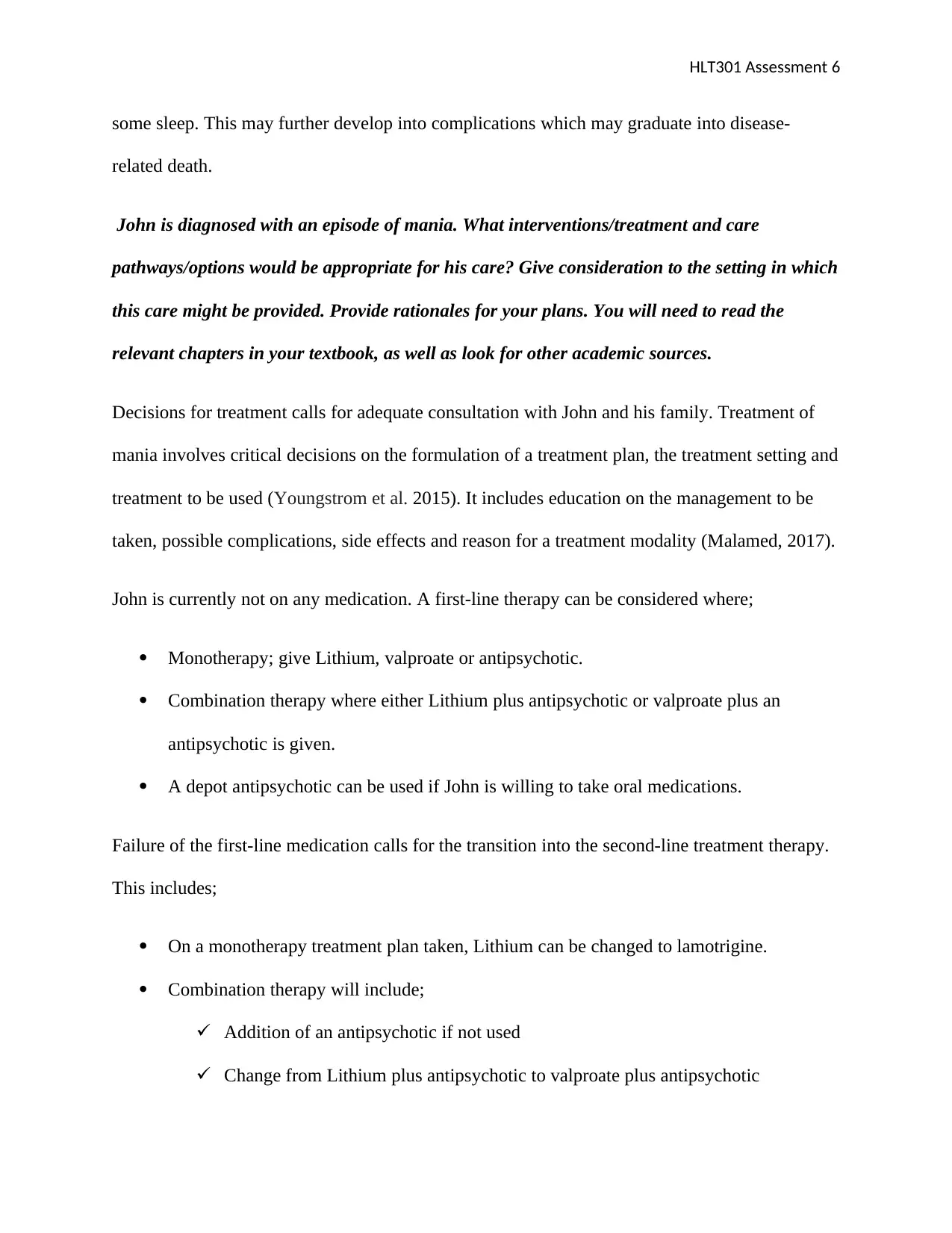
HLT301 Assessment 6
some sleep. This may further develop into complications which may graduate into disease-
related death.
John is diagnosed with an episode of mania. What interventions/treatment and care
pathways/options would be appropriate for his care? Give consideration to the setting in which
this care might be provided. Provide rationales for your plans. You will need to read the
relevant chapters in your textbook, as well as look for other academic sources.
Decisions for treatment calls for adequate consultation with John and his family. Treatment of
mania involves critical decisions on the formulation of a treatment plan, the treatment setting and
treatment to be used (Youngstrom et al. 2015). It includes education on the management to be
taken, possible complications, side effects and reason for a treatment modality (Malamed, 2017).
John is currently not on any medication. A first-line therapy can be considered where;
Monotherapy; give Lithium, valproate or antipsychotic.
Combination therapy where either Lithium plus antipsychotic or valproate plus an
antipsychotic is given.
A depot antipsychotic can be used if John is willing to take oral medications.
Failure of the first-line medication calls for the transition into the second-line treatment therapy.
This includes;
On a monotherapy treatment plan taken, Lithium can be changed to lamotrigine.
Combination therapy will include;
Addition of an antipsychotic if not used
Change from Lithium plus antipsychotic to valproate plus antipsychotic
some sleep. This may further develop into complications which may graduate into disease-
related death.
John is diagnosed with an episode of mania. What interventions/treatment and care
pathways/options would be appropriate for his care? Give consideration to the setting in which
this care might be provided. Provide rationales for your plans. You will need to read the
relevant chapters in your textbook, as well as look for other academic sources.
Decisions for treatment calls for adequate consultation with John and his family. Treatment of
mania involves critical decisions on the formulation of a treatment plan, the treatment setting and
treatment to be used (Youngstrom et al. 2015). It includes education on the management to be
taken, possible complications, side effects and reason for a treatment modality (Malamed, 2017).
John is currently not on any medication. A first-line therapy can be considered where;
Monotherapy; give Lithium, valproate or antipsychotic.
Combination therapy where either Lithium plus antipsychotic or valproate plus an
antipsychotic is given.
A depot antipsychotic can be used if John is willing to take oral medications.
Failure of the first-line medication calls for the transition into the second-line treatment therapy.
This includes;
On a monotherapy treatment plan taken, Lithium can be changed to lamotrigine.
Combination therapy will include;
Addition of an antipsychotic if not used
Change from Lithium plus antipsychotic to valproate plus antipsychotic
⊘ This is a preview!⊘
Do you want full access?
Subscribe today to unlock all pages.

Trusted by 1+ million students worldwide
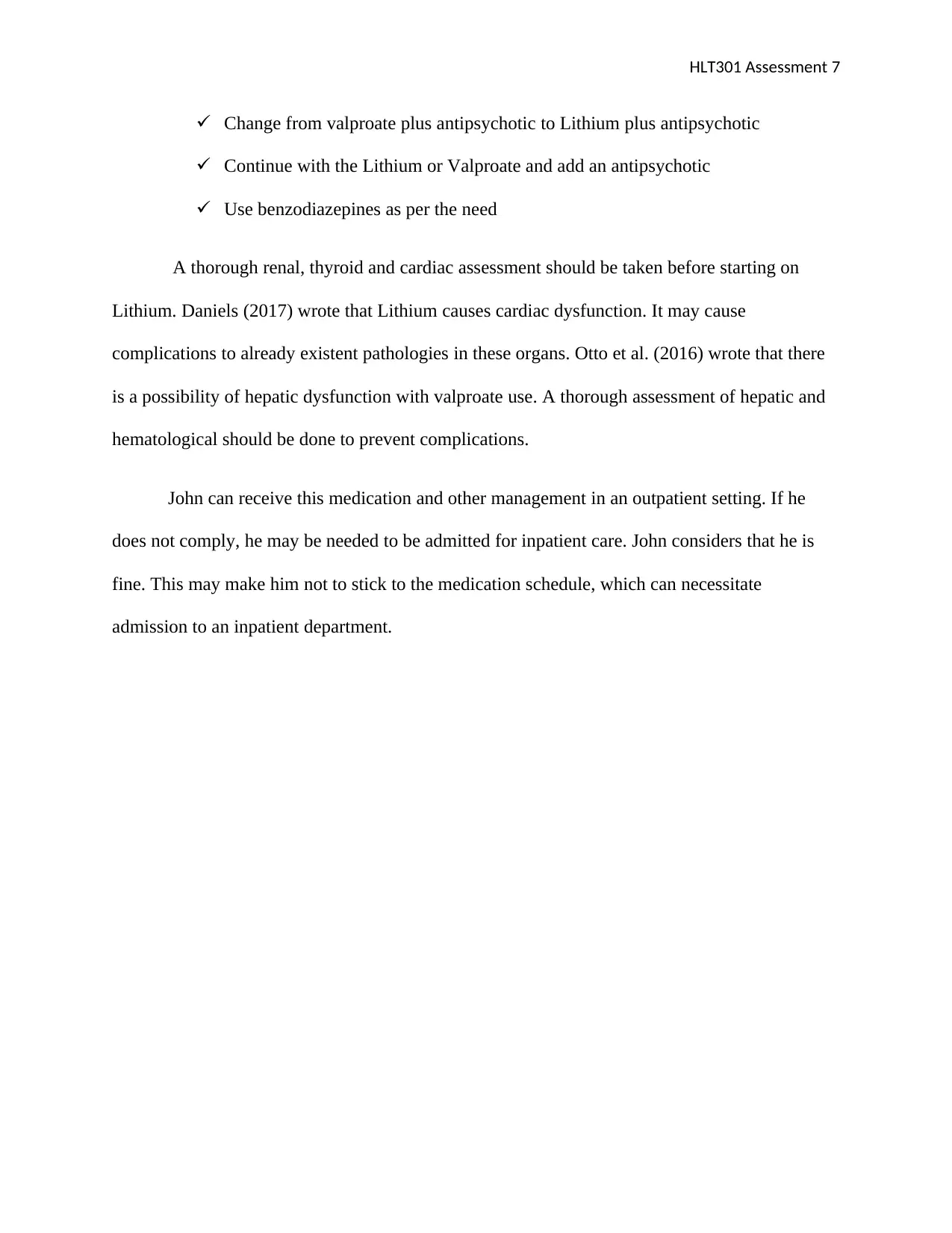
HLT301 Assessment 7
Change from valproate plus antipsychotic to Lithium plus antipsychotic
Continue with the Lithium or Valproate and add an antipsychotic
Use benzodiazepines as per the need
A thorough renal, thyroid and cardiac assessment should be taken before starting on
Lithium. Daniels (2017) wrote that Lithium causes cardiac dysfunction. It may cause
complications to already existent pathologies in these organs. Otto et al. (2016) wrote that there
is a possibility of hepatic dysfunction with valproate use. A thorough assessment of hepatic and
hematological should be done to prevent complications.
John can receive this medication and other management in an outpatient setting. If he
does not comply, he may be needed to be admitted for inpatient care. John considers that he is
fine. This may make him not to stick to the medication schedule, which can necessitate
admission to an inpatient department.
Change from valproate plus antipsychotic to Lithium plus antipsychotic
Continue with the Lithium or Valproate and add an antipsychotic
Use benzodiazepines as per the need
A thorough renal, thyroid and cardiac assessment should be taken before starting on
Lithium. Daniels (2017) wrote that Lithium causes cardiac dysfunction. It may cause
complications to already existent pathologies in these organs. Otto et al. (2016) wrote that there
is a possibility of hepatic dysfunction with valproate use. A thorough assessment of hepatic and
hematological should be done to prevent complications.
John can receive this medication and other management in an outpatient setting. If he
does not comply, he may be needed to be admitted for inpatient care. John considers that he is
fine. This may make him not to stick to the medication schedule, which can necessitate
admission to an inpatient department.
Paraphrase This Document
Need a fresh take? Get an instant paraphrase of this document with our AI Paraphraser
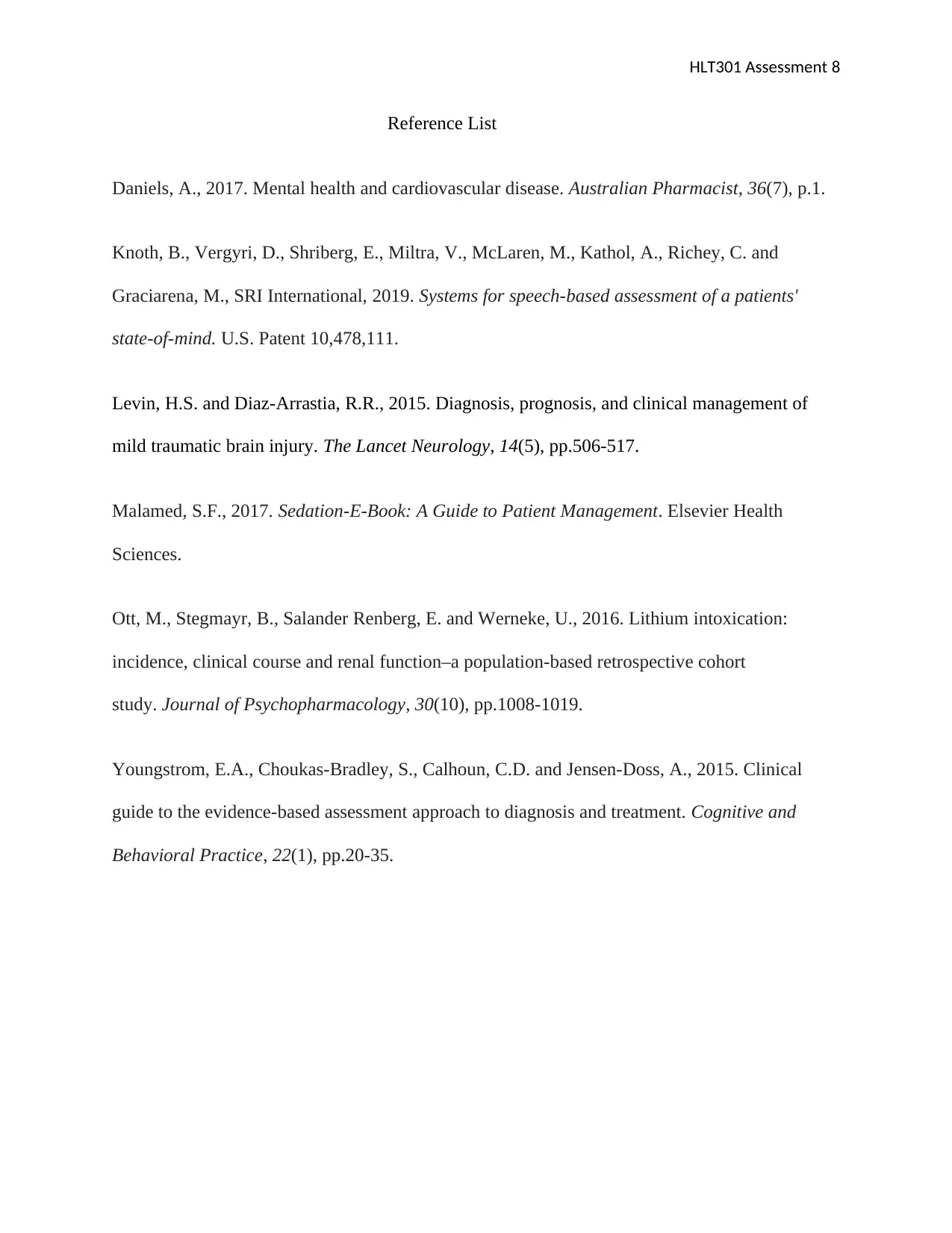
HLT301 Assessment 8
Reference List
Daniels, A., 2017. Mental health and cardiovascular disease. Australian Pharmacist, 36(7), p.1.
Knoth, B., Vergyri, D., Shriberg, E., Miltra, V., McLaren, M., Kathol, A., Richey, C. and
Graciarena, M., SRI International, 2019. Systems for speech-based assessment of a patients'
state-of-mind. U.S. Patent 10,478,111.
Levin, H.S. and Diaz-Arrastia, R.R., 2015. Diagnosis, prognosis, and clinical management of
mild traumatic brain injury. The Lancet Neurology, 14(5), pp.506-517.
Malamed, S.F., 2017. Sedation-E-Book: A Guide to Patient Management. Elsevier Health
Sciences.
Ott, M., Stegmayr, B., Salander Renberg, E. and Werneke, U., 2016. Lithium intoxication:
incidence, clinical course and renal function–a population-based retrospective cohort
study. Journal of Psychopharmacology, 30(10), pp.1008-1019.
Youngstrom, E.A., Choukas-Bradley, S., Calhoun, C.D. and Jensen-Doss, A., 2015. Clinical
guide to the evidence-based assessment approach to diagnosis and treatment. Cognitive and
Behavioral Practice, 22(1), pp.20-35.
Reference List
Daniels, A., 2017. Mental health and cardiovascular disease. Australian Pharmacist, 36(7), p.1.
Knoth, B., Vergyri, D., Shriberg, E., Miltra, V., McLaren, M., Kathol, A., Richey, C. and
Graciarena, M., SRI International, 2019. Systems for speech-based assessment of a patients'
state-of-mind. U.S. Patent 10,478,111.
Levin, H.S. and Diaz-Arrastia, R.R., 2015. Diagnosis, prognosis, and clinical management of
mild traumatic brain injury. The Lancet Neurology, 14(5), pp.506-517.
Malamed, S.F., 2017. Sedation-E-Book: A Guide to Patient Management. Elsevier Health
Sciences.
Ott, M., Stegmayr, B., Salander Renberg, E. and Werneke, U., 2016. Lithium intoxication:
incidence, clinical course and renal function–a population-based retrospective cohort
study. Journal of Psychopharmacology, 30(10), pp.1008-1019.
Youngstrom, E.A., Choukas-Bradley, S., Calhoun, C.D. and Jensen-Doss, A., 2015. Clinical
guide to the evidence-based assessment approach to diagnosis and treatment. Cognitive and
Behavioral Practice, 22(1), pp.20-35.
1 out of 8
Related Documents
Your All-in-One AI-Powered Toolkit for Academic Success.
+13062052269
info@desklib.com
Available 24*7 on WhatsApp / Email
![[object Object]](/_next/static/media/star-bottom.7253800d.svg)
Unlock your academic potential
Copyright © 2020–2025 A2Z Services. All Rights Reserved. Developed and managed by ZUCOL.





